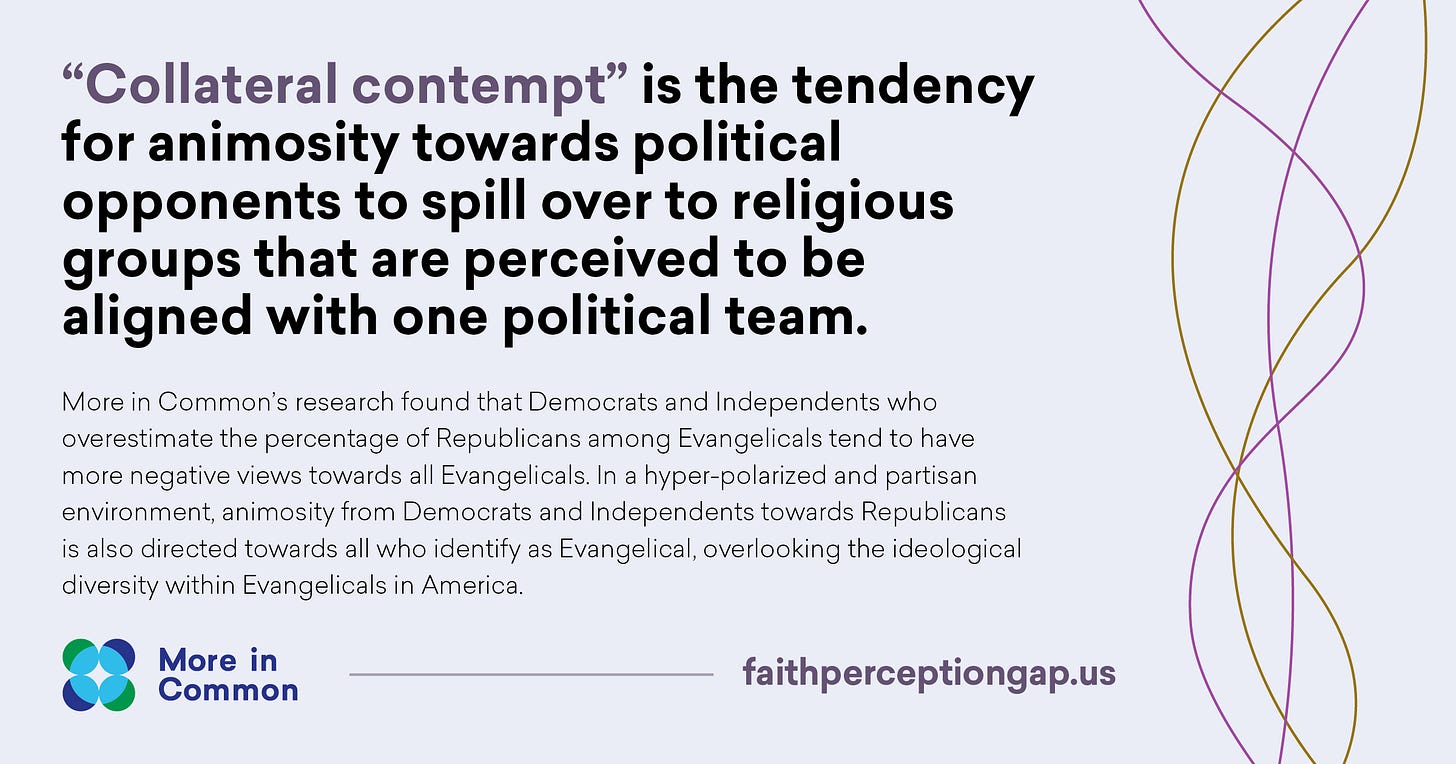How deeply are our faith communities driven by politics?
A new report by More in Common may challenge and inspire you to rethink the role of faith in the United States.
Summary: More in Common US released their latest report, Promising Revelations: Undoing the false impressions of America’s faithful, which explores the intersections between faith, politics and polarization and addresses key misperceptions of Christian, Jewish and Muslim communities in the United States.
Our perception of religion in the United States has become increasingly distorted by partisan politics and misinformed stereotypes. Our newest report, Promising Revelations, sheds light on false assumptions about faith communities and explores how misperceptions contribute to division in society.
Drawing on research from more than 6,000 Americans, with a specific focus on Christian, Jewish and Muslim Americans, our latest study finds significant perception gaps—disparities between what Americans imagine people of faith to believe and what they actually believe.
The insights specifically challenge the narratives that Evangelicals are chiefly concerned with politics, that the relevance of religion is fading, that young generations feel distant from their faith, and that religious Americans are mostly intolerant of others.
These perception gaps have significant consequences. People of faith across most traditions often feel misunderstood and misrepresented, while Muslims and Jews, in particular, face increasing threats to their safety due to rising antisemitism and anti-Muslim hate crimes. In a time of growing polarization, these misperceptions limit our ability to imagine a future where America’s faithful can play a key role in bridging divides and fostering social cohesion.
Below are key insights from our report that challenge these myths and can help us recognize the unifying potential of spiritual belief.
The Reality
1. Faith is not all about politics
Many Americans have significant misperceptions about the role of politics in faith communities, particularly in Evangelical Christian and Catholic communities. Americans often overestimate the importance Evangelicals and Catholics place on their political identity and partisan affiliation. For example, non-Evangelicals overestimate by ten times how much Evangelicals say political party affiliation is their most important identity (41 percent estimate versus 4 percent in reality) and overestimate the percentage of Evangelicals who say “being a good Christian means supporting the Republican Party (55 percent estimate versus 20 percent in reality).
One consequence of the politicization of faith communities is what we call “Collateral Contempt.” Our research found that Democrats and Independents who overestimate the percentage of Republicans among Evangelicals tend to have more negative views towards all Evangelicals. Collateral contempt refers to the tendency for animosity towards political opponents to spill over to religious groups perceived to be aligned with one political team.
2. Faith remains relevant in Americans’ lives
Americans have significant perception gaps when it comes to understanding how important faith is to their fellow citizens, especially to younger generations. Our research found that a majority of Americans—73 percent—consider their faith an important part of their identity, including 66 percent of Gen Z Americans (generation born after 1996). Gen Z Americans are more likely than older generations to turn to their respective faith traditions for belonging (34 percent versus 27 percent national average) and community (28 percent versus 24 percent national average).
3. Religious Americans value pluralism
Lastly, most Americans across faiths deeply value religious pluralism and aspire for the U.S. to be a place where all beliefs are respected. For instance, the public assumes only about half of Evangelicals and Muslims support religious pluralism, while 78 percent of Evangelicals and 75 percent of Muslims do.
The Consequences
Misperceptions often reduce the rich diversity of faith communities to simplistic stereotypes. Our research indicates these distortions are felt among Americans of faith. Over half of Evangelicals, Jews, Muslims, and Latter-day Saints feel judged or misrepresented. For Jewish and Muslim Americans, the feelings of being misunderstood and misrepresented are compounded by threats to their physical safety. Over four in ten Muslims and Jews in America feel or have felt unsafe in the past year due to their religious identity.
Take Action
When we steer away from misperceptions and stop seeing faith through a political lens, we open ourselves to hearing new stories that humanize fellow Americans. In a moment defined by polarization and fracture, many values and life goals that Americans cherish transcend religious boundaries and could be used as a basis for more productive dialogue and relationship-building between different communities.
For many, faith communities provide a sense of meaning and belonging far deeper than politics. While this may not be their central mission, they possess a wealth of wisdom, rituals, and resources that emphasize shared values and help cultivate the skills and community needed to navigate conflict, bridge divides and foster belonging.
Here are some things each of us can do right now to correct misperceptions of Americans of faith and reimagine the vital role they can play moving forward:
👉 Read our recommendations, which explore the role that various actors, from faith leaders to media, can play in correcting misperceptions. Are there any you can incorporate into your work or life?
👉Explore the website for insights unique to the faith communities profiled in the report including, Evangelical Christian, Mainline Protestant, Catholic, Jewish, Muslim and Latter-day Saint communities.
👉 Read the full report. What insights did you find surprising?
👉 Share our findings on social media. Tag us!
👉 Sign-up to join one of our upcoming webinars.
Join Christian, Jewish, and Muslim faith leaders and One America Movement to discuss the report’s misperceptions in practice: September 30 1:00-2:30 PM ET
Dive into Christian findings with the Center for Christianity and Public Life: October 23 1:00-2:30 ET PM
Sign up here to receive notifications about future webinars focused on Jewish, Muslim and Latter-day Saint communities.
We can’t do this without you!
MIC regularly conducts research that sheds light on both cross-group misperceptions and common ground. Consider supporting our work by making a donation.









